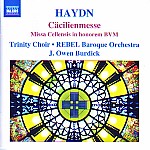This disc originally was released on Hänssler, but now it reappears as part of Naxos’ complete Haydn Mass Edition. There haven’t been many recordings of Haydn’s brilliant and opulent Missa Cellensis. Simon Preston contributed a decent if somewhat soft-edged version for L’Oiseau Lyre, but the outstanding recording to date has been Rafael Kubelik’s on Orfeo. Huge in conception and bold in execution, Kubelik’s very modern-instrument view convincingly places the work in the tradition of the great classical masterpieces of choral music, and only he has his sopranos sing the complete concluding phrase of the Credo as Haydn didn’t write it, high notes and all, a triumph of practical musicianship that’s far more “authentic” than the more literal renditions of the period-performance crowd.
That said, we certainly could use a first-rate view of the piece on a smaller scale, something more along the lines of what Haydn himself would have expected–and now we have one. Conductor Owen Burdick, the choir of Trinity Church, Wall Street, and the REBEL Baroque Orchestra turn in a performance that goes straight to the top of the heap in terms of clarity, energy, musicality, and ensemble coordination. One of the great strengths of these forces in a work such as this is the fact that the vocal soloists are all members of the chorus. That doesn’t mean that they are less than good: in fact, soprano Julie Liston is fantastic, with a bright timbre, agile technique, and a real trill to boot. She blows away Susan Gritton on Richard Hickox’s unimpressive effort on Chandos. Beyond that, having the soloists sing with the chorus keeps voices and instruments on the same plane, so there’s no distracting change of perspective as brief solos alternate with choral and orchestral interjections.
Of course, none of this would matter if the rest of the singing, playing, and conducting weren’t superb; but they certainly are. Listen to the way Burdick launches the allegro of the Kyrie–like a rocket–and to the perfect clarity of balance between voices and instruments. Burdick understands (as Hickox does not) the critical importance of keeping rhythms crisp, even in more contemplative sections such as the Sanctus. The REBEL Baroque Orchestra really plays well: trumpets and drums have the requisite panache and the strings offer excellent intonation and an appealingly sweet timbre that never turns scruffy or thin.
Highlights are many: the glorious concluding fugues of the Gloria, Credo, and Dona nobis pacem (happily Burdick isn’t afraid to make a few welcome ritards at the very ends, rather than simply letting the music run into a brick wall as so many others do); Liston’s brilliant singing of her difficult “Quoniam” aria in the Gloria; the gorgeous “Et incarnatus” section of the Credo; and the heartfelt account of the Benedictus.
The Hänssler release also included the Missa Brevis in F as a coupling, but the Missa Cellensis is still 65 minutes long as it is, and the short Mass now appears on another volume in this series. As suggested above, the recording perfectly balances the voices and instruments: you can hear everything. If you already own Kubelik’s recording, get this one too. Together they offer just about the total range of possibilities in this marvelous music. And if you have space for only a single version, then let this be the one. [4/28/2010]
































